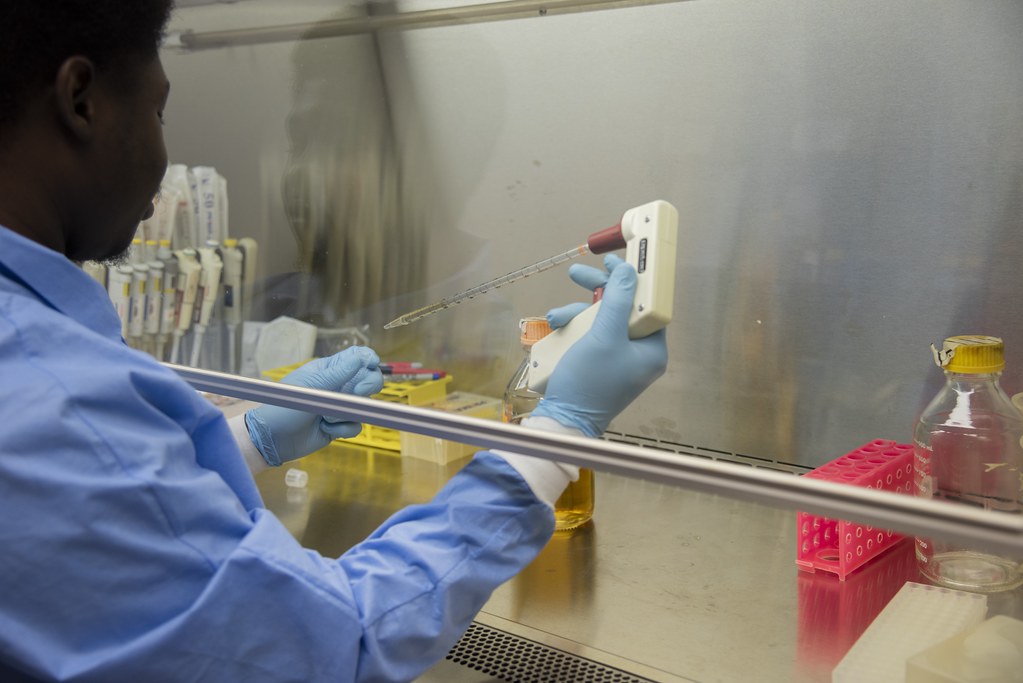Summer break. For most students it’s a time to relax and unwind from school, but for Samuel Anakpeba-Dinguyella, he saw it as an opportunity to exercise his creativity in new and inventive ways.
“My mom was washing dishes and I was in the living room. I was just messing around,” Anakpeba-Dinguyella said. “I remember holding a pair of dividers and a compass just trying to take apart the radio in the living room and that’s when I was like, I want to be a scientist. But, that started the angle of being an electrical engineer or something of the sort, not related to biochemistry or biology yet.”
This was the first of many experiments for Anakpeba-Dinguyella and a step towards a career in science, an unusual choice in his family.
“I grew up in a family of accountants, public administrators and managers, and no one really pursued a science role, but ever since grade four I have had a thing for science,” Anakpeba-Dinguyella said.
He earned his bachelor’s degree in biochemistry from the University of Ghana and is now a Ph.D. graduate student at the University of Missouri, working in the Michael Petris lab at Bond LSC.
Anakpeba-Dinguyella first discovered his passion for cancer research working under his undergraduate mentor. His job involved going to the hospital in order to collect and process tumor and healthy tissue samples from chemo-naïve breast cancer patients, or those that have had little experience with chemotherapy. The aim of the research was to learn more about the cancer commonalities and genetic risk factors that Ghanaian women are predisposed to. But the experience of it all is what stuck with him the most.
“During my interaction with cancer patients prior to and after their surgery, it was a heavy moment for me,” Anakpeba-Dinguyella said. “You could see that some of these people were afraid and thinking that life is not going to be the same. I still hold those memories.”
He sees these interactions as ones that are vital to building a concrete connection between science and the people it is affecting.
“If you are doing everything from the bench and you don’t interact with the patients or people who are suffering from this disease, you wouldn’t know,” Anakpeba-Dinguyella said. “You have an idea, but then the story doesn’t touch you that much because it’s still an abstract idea until you have that in-person experience.”
Cancer research became Anakpeba-Dinguyella’s sole career focus after seeing the influence it has on many lives. He holds these recollections as moments that remind him why he does this type of work.
“I would have still been doing this type of research without that experience, but the in-person encounters really pushed me more into it, and I am grateful for that,” Anakpeba-Dinguyella said.
He applies his undergraduate knowledge to his daily work with copper transporters, which heavily influence the migration of cancer cells from the primary site that they first began to secondary sites in the body, a process known as metastasis. Anakpeba-Dinguyella studies the roles of copper transporters in the progression of cancers and other pathologies. He studies how the small molecule inhibitor, MKV3, suppresses the activity of these transporters with the hope of reverting the observed disease phenotypes. MKV3 is named after Michael Petris, Kamal Singh, and Vinit Shanhbhag, who all worked to discover the compound. It is essential in blocking the functions of ATP7A and has been proven useful in stopping the growth of cancer cells, both in vivo and in vitro.

Anakpeba-Dinguyella constantly connects his work with copper transporters back to the people this research affects the most. He compares his experiences and the things he sees in the world to experiments in the lab, functioning together for one purpose.
“I know I am able to walk from here to where I park my car, but what are the things that drive me walking,” Anakpeba-Dinguyella said. “Is it how my sight is connected to my movement, or other factors like that?”
He relishes in these moments of clarity and enjoys time outside where he recognizes the many moving parts of the world around him. He relaxes for the day at the park, but he also enjoys cooking, listening to music, playing the occasional game of ping pong or football, and playing adventure-based video games.
“I love going to the park and being outdoors for the sunlight and the fresh air,” Anakpeba-Dinguyella said.
Outdoors may give him a break from his bench work, but the nuances of research make him excited to see results that can lead to varied, unforeseen conclusions.
“It’s definitely not the same work every day, because you get to see different angles,” Anakpeba-Dinguyella said. “Maybe today you got these results, and you went in looking for A, B, and C, but then by chance we came up with E and F. And then you think, what do E and F hold for us? And, it opens up a new chapter to just keep going.”

This skill of inspecting and identifying cancer cells leads him to have a strong affiliation with science and all that it can reveal.
“I love science because it gives meaning to the things we see and the fact that we keep chasing these leads” Anakpeba-Dinguyella said. “There’s a disease, but what are the factors that make this disease progress? Being able to identify and understand some of the things we see in the world is important.”
It all started with dismantling a home radio and examining the mechanisms within it. But now it has led to a career in a field that Anakpeba-Dinguyella feels connected to.
It think all of this needs to go.


